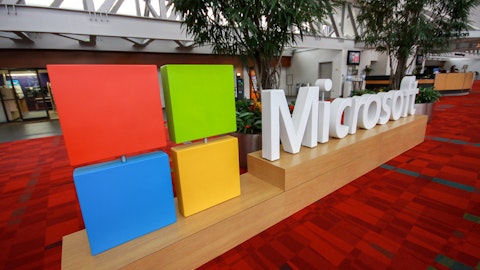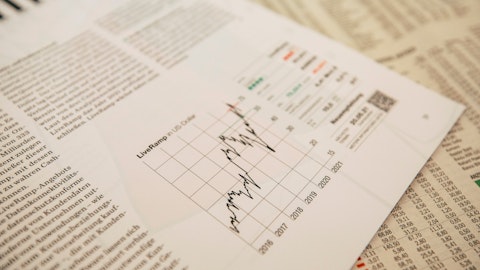Las Vegas Sands Corp. (NYSE:LVS) Q4 2023 Earnings Call Transcript January 24, 2024
Las Vegas Sands Corp. isn’t one of the 30 most popular stocks among hedge funds at the end of the third quarter (see the details here).
Operator: Good day, ladies and gentlemen, and welcome to the Sands Fourth Quarter 2023 Earnings Conference Call. At this time, all participants have been placed on a listen-only mode, and we will open the floor for your questions and comments following the presentation. It is now my pleasure to turn the floor over to Mr. Daniel Briggs, Senior Vice President of Investor Relations at Sands. Sir, the floor is yours.
Daniel Briggs: Thank you. Joining the call today are Rob Goldstein, our Chairman and CEO; Patrick Dumont, our President and Chief Operating Officer; Dr. Wilford Wong, Executive Vice Chairman of Sands China; and Grant Chum, CEO and President of Sands China and EVP of Asia Operations. Today’s conference call will contain forward-looking statements. We’ll be making those statements under the safe harbor provision of federal securities laws. The company’s actual results may differ materially from the results reflected in those forward-looking statements. In addition, we will discuss non-GAAP measures. Reconciliations to the most comparable GAAP financial measures are included in our press release. We have posted an earnings presentation on our website.
We will refer to that presentation during the call. Finally, for the Q&A session, we ask those with interest to please pose one question and one follow-up, so we might allow everyone with interest the opportunity to participate. This presentation is being recorded. I’ll now turn the call over to Rob.
Rob Goldstein: Thanks, Dan, and thanks for joining us today. Macao delivered $654 million of EBITDA for the quarter. The number would have been $40 million higher if we had held as expected in the rolling segment. It’s only been one year since the end of COVID in Macao. We began in Q1 with $400 million of EBITDA. In Q2, we did $540 million. Q3, we did $630 million. The growth just keeps coming. We look forward to continued growth in both gaming and non-gaming revenue, which will lift in our market. SCL continues to own the largest share of non-rolling table win, rolling table win and slot ETG win. Most importantly, we have the largest share of EBITDA in Macao market by a wide margin. We believe the completed London will need and perhaps even exceed the earning power of the nation.
Our future growth in Macao is tethered to these powerful assets, which will drive growth in the years ahead, whether it’s rooms, gaming capacity, retail, entertainment, food and beverage, we have stellar assets. Those assets will even get better as we complete the ongoing $1.2 billion Londoner reinvestment program. There is an ongoing speculation of the future growth of Macao. Can Macao market grow to $30 billion, $35 billion, even $40 billion and beyond? We believe that it will. This underscores our confidence in the returns that we generated by capital investment programs in our portfolio. We are staunch believers in the growth of the Macao market in near and long-term. LBS has invested $15 billion in Macao to date. Macao is the most important land-based market in the world.
A few reference points to consider, fourth quarter EBITDA, assuming expected hold on rolling play represents considerable growth when compared to the previous quarters. Our retail business in Macao has already far exceeded pre-COVID numbers. I continue to expect the gaming force on our business to follow the same path as Singapore and accelerate in 2024. Let’s pivot to the MBS and Singapore. Seven quarters into our reopening, MBS delivered a $544 million a quarter. This is the largest EBITDA for one quarter in the history of the building. The power of this building is evident based on the results despite the disruptive impact of our ongoing $1.75 billion renovation. Disruption notwithstanding MBS is hitting on all cylinders with gaming, lodging and retail perspective.

Slots in ETG’s MBS are approaching a $1 billion annual run rate. Non-rolling tables are exceeding $20 million of the drop per day. ADRs are escalating and the retail component is delivering far beyond pre-COVID numbers. MBS validates the quality assets prevail and reinvesting in our assets will generate sustained returns. MBS has it all, our iconic building with superb decor and service levels, which attract the most desirable customers in every segment. At the completion of both phases of the renovation program, MBS will feature 770 suites, we previously had less than 200 suites. There is no denying its future. How far can MBS go. Our future expectations starts at $2 billion and beyond in EBITDA per year. As you know, we’re bidding for a license in New York.
We’re receiving strong local support. The cost of the building will be in the $6 billion range, which enables us to develop a true five-star resort with [indiscernible]. This is a massive opportunity. We are very enthused about the prospect. Our bid is compelling. If we receive the license, we’d be in the ground as quickly as possible. Thank you for joining us today. I’ll turn the call over to Patrick before we move on to Q&A.
Patrick Dumont: Thanks, Rob. We wanted to highlight some changes in the materials that we typically provide for the quarter. After discussions and review with the SEC, we will no longer be presenting hold-normalized adjusted property EBITDA in our press releases, SEC filings and supplemental earnings materials. These changes are being made to our materials for this quarter and for our reporting going forward. We believe that the analysis of our financial and operating results in any quarter will continue to benefit from an understanding of the impact of expected hold in our rolling volume segments for our reported results. We will continue to provide the impact of expected hold in our rolling volume segments for our earnings materials.
Please see Pages 6 and 7 in our earnings presentation for an overview of the new presentation format. For this quarter, the quarter ended December 31, 2023, we generated $654 million of adjusted property EBITDA in Macao, a very strong operating result. It is important to note that we held 2.16% in our rolling segment in Macao. EBITDA would have been higher by $40 million in Macao had we held as expected in our rolling segment. At Marina Bay Sands for the fourth quarter of 2023, we generated $544 million in adjusted property EBITDA, another strong result. We held 4.57% in our rolling segment in Singapore. EBITDA would have been lower by $71 million in MBS had we held as expected in our Rolling segment. It is also important to address our margin structure as we held as expected in our rolling line segments in Macao and Singapore.
In Macao, our margins for the fourth quarter of 2023 would have been 35.9%, an improvement of 100 basis points as compared to the third quarter of 2023, if our hold was as expected in our rolling volume segment. At MBS, had we held as expected in our rolling volume segment, o ur fourth quarter 2023 margin would have been 48.8%, an increase of 170 basis points sequentially. It’s important to note that both in Macao and in Marina Bay Sands in Singapore, we are generating revenue growth, EBITDA growth and when considering expected hold for rolling volume segments, margin expansion. We are very focused on the quality of our offerings on further investment to drive high-value visitation to our properties on the resulting revenue growth and our margin expansion over time.
Looking ahead, we are excited about our progress in our markets, and we are focused on growth for the long term. Let’s move to the Q&A portion of our call. Thanks.
See also 20 Highest Quality Luggage Brands for 2024 and 30 Low Cost Products With High Profit Margins.
Q&A Session
Follow Las Vegas Sands Corp (NYSE:LVS)
Follow Las Vegas Sands Corp (NYSE:LVS)
Receive real-time insider trading and news alerts
Operator: Thank you. Ladies and gentlemen, the floor is now open for questions. [Operator Instructions] And your first question today is coming from Joe Greff from JPMorgan. Joe, your line is live. Please go ahead.
Joe Greff: Good afternoon, guys. Thanks for taking my question.
Rob Goldstein: Hi, Joe.
Joe Greff: Obviously, the premium mass had significant sequential growth and exceeded the base mass. I was just hoping — can you talk about the progression of base mass recovery throughout the fourth quarter? And then clearly, what we’re seeing out of information for the Macao market as a whole, in January month-to-date is nice overall mass growth pickup. And as you said before, Rob, the growth keeps coming. I was hoping if you can talk about sort of the relative performance of base mass in January and if we’re seeing this hopefully anticipated pickup in that mass segment?
Rob Goldstein: Thanks, Joe. As you know, we don’t comment on the current quarter. The numbers speak for themselves so the market appreciation in Macao in January thus far has been published, a very encouraging doesn’t it, a continuation of December. As for our performance in Q4, I’ll turn to Grant to talk about the acceleration of base and premium mass. Grant?
Grant Chum: Yes, Rob. Thank you. Yes, Joe, the segment differential growth in the fourth quarter, we had 13% growth in premium mass and 8% growth sequentially on base mass. So I think base mass was progressing nicely through the quarter. It’s just that premium mass had a great performance that exceeded that. If you look at the visitation trends during the fourth quarter, Macao actually recovered to almost 90% of 2019 levels on visitations. So I think the base mass is continuously progressing and building up. Transportation infrastructure has been improving. I think the demand to come, I think the desire to take advantage of the non-gaming events that have been coming on stream across our properties, but across the whole industry, have been very effective. So I think you should expect that growth pattern to continue.
Rob Goldstein: Grant can say also – Grant, why I ask is it fair to say transportation and Visa, the whole lubricant that supplies the market into Macao is getting better year after COVID. It seems to me as if the ability to get the desire is there, but also the ability that this improving daily. Is that fair to say?
Grant Chum: Yes. The ability to get there has been improving, but the desirability of the destination is even clearer. You can see that the domestic flight to mainland key Greater Bay Area airports has all but fully recovered. And if you look at our ferry statistics, passengers that we carried in the fourth quarter recovered to 93% of pre-COVID, but only 52% of our sailing capacity. So clearly, people are enthusiastic about coming even though the transportation capacity is still recovering. And that’s also clear, very gratifyingly the overseas, the foreign visitation recovered dramatically in fourth quarter, especially from Southeast Asia, and that’s great to see from Macao. And that’s despite the direct flights from foreign countries into Macao, haven’t recovered even by, I think, 60% in the fourth quarter versus pre-COVID. But the visitation now is getting back up to 80%, 90% of what it was before despite the flight connectivity still catching up.
Joe Greff: Great. And then my follow-up…
Patrick Dumont: Hey, Joe, it’s a — Joe, before the follow-up, one thing important to note also, it’s been a while since we talked about this. But we actually have capacity to absorb base mass business as it continues to come into the market. So when you think about the property portfolio that we have, the investment that we’ve made in terms of amenities, the tourism attraction for the base mass customer, the ability to service that customer in terms of food and beverage, shopping, entertainment, but also the fact that we have the capacity as that market continues to grow, we’ll be the beneficiary of that. And it’s important to note, because the market is not at capacity yet. So as more visitors come in this base mass segment, we’ll have the ability to absorb it. Sorry, what’s your next question?
Joe Greff: My next question is for you, Patrick. Obviously, it’s nice to see $1 billion of buyback activity this past quarter. Do you view that as a sustainable level unless there’s some huge volatility in the share price level?
Patrick Dumont: I think there was — I think there was some activity during the quarter, and to be fair, I think we looked at the share price levels as an opportunity. When we think about our future capital return, as we said before, we kind of expect our share repurchase will be more heavily weighted into that. And so I think we fundamentally believe in the long-term value of share repurchases, the benefit of the compounding, the benefit of the share shrink, trigging that denominator. In terms of amount, I think we’ll be measured across time. If you sort of look at our balance sheet, you look at the free cash flow we generate, we’re going to look to be aggressive when we can. And I think we’re going to run a program where we look to acquire shares consistently over time. But I think — I don’t know that we’ll necessarily buy the same amount that we bought in this quarter going forward every quarter.





